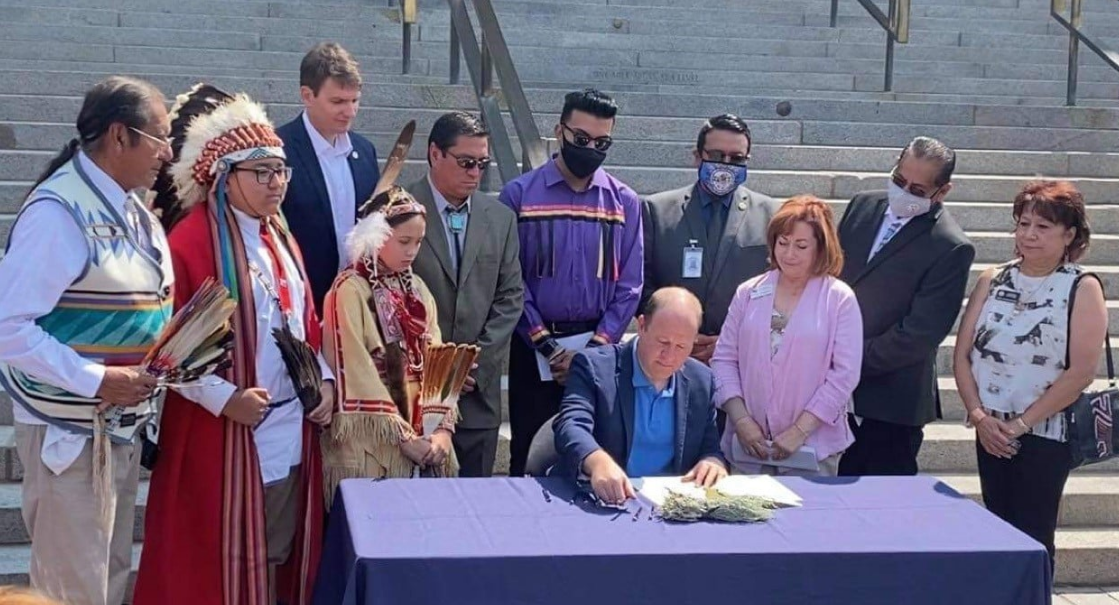
- Details
- By Native News Online Staff
DENVER— In a long overdue gesture, Colorado Gov. Jared Polis (D) on Tuesday signed an Executive Order rescinding a pair of 19th century proclamations that granted the right to kill American Indians.
The original proclamation was signed in June 1864 by then Territorial Governor John Evans, who also served as superintendent of Indian Affairs. Evans issued a proclamation that “intended to prevent friendly Indians from being killed through mistake… The war on hostile Indians will be continued until they are all effectually subdued."
Want more Native News? Get the free daily newsletter today.
On August 11, 1864, Evans issued another proclamation that authorized Colorado Territory citizens to “kill and destroy as many enemies of the country, wherever they may be found, all such hostile Indians.”
Those who killed Indians were given property as a reward.
The two proclamations set the stage for the Sand Creek Massacre on Nov. 29, 1864, resulting in the deaths of at least 133 Cheyenne and Arapaho women, children and elders by 700 members of the Colorado territory militia.
Polis rescinded the proclamations on Tuesday, joined on the steps of the Colorado State Capitol by citizens of the Southern Ute, Ute Mountain Ute, Cheyenne and Arapaho Tribe, and the Northern Arapaho Tribe, as well as members of Colorado's American Indian and Alaska Native communities, Lt. Gov. Dianne Primavera and other Colorado state officials.
Gov. Polis called Evans’ proclamations shameful and found it necessary to remove a gross abuse of power for a dark period of Colorado’s territorial history.
Want to support Native News? Make a donation today.
A portion of the Executive Order reads:
“The 1864 Proclamations were never lawful because they violated established treaty rights and federal Indian law. Further, when Colorado became a state, they never became law, as they were superseded by the Colorado Constitution, United States Constitution, and Colorado criminal code. Yet, the 1864 Proclamations have never been officially rescinded. They therefore remain as a symbol of a gross abuse of executive power during that grave period in our State’s history.
For these reasons, I find it necessary to officially finally rescind the shameful 1864 Proclamations through this Executive Order and provide closure for this dark period of our territorial history.”
Colorado became the 38th state of the United States on August 1, 1876.
Updated: Thursday, Aug. 19, 2021 - 11:15 a.m. - EDT
More Stories Like This
Native News Weekly (August 25, 2024): D.C. BriefsNavajo Nation Mourns the Passing of Former Vice President Rex Lee Jim
Deb Haaland Earns Endorsement From Communications Workers of America Local 7076
University Soccer Standout Leads by Example
Two Native Americans Named to Democratic Congressional Campaign Committee's“Red to Blue” Program
Help us defend tribal sovereignty.
At Native News Online, our mission is rooted in telling the stories that strengthen sovereignty and uplift Indigenous voices — not just at year’s end, but every single day.
Because of your generosity last year, we were able to keep our reporters on the ground in tribal communities, at national gatherings and in the halls of Congress — covering the issues that matter most to Indian Country: sovereignty, culture, education, health and economic opportunity.
That support sustained us through a tough year in 2025. Now, as we look to the year ahead, we need your help right now to ensure warrior journalism remains strong — reporting that defends tribal sovereignty, amplifies Native truth, and holds power accountable.
 The stakes couldn't be higher. Your support keeps Native voices heard, Native stories told and Native sovereignty defended.
The stakes couldn't be higher. Your support keeps Native voices heard, Native stories told and Native sovereignty defended.
Stand with Warrior Journalism today.
Levi Rickert (Potawatomi), Editor & Publisher

